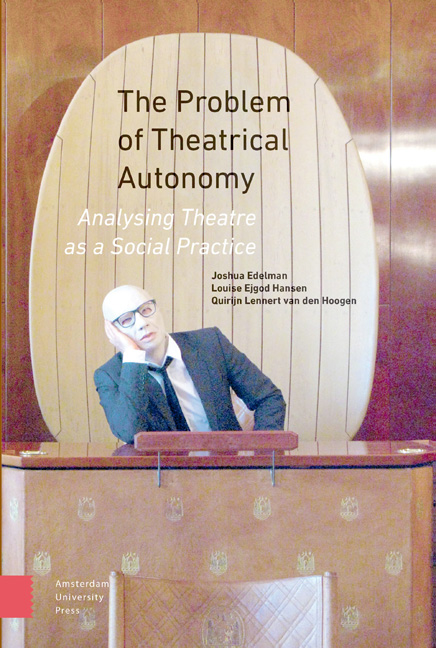Book contents
- Frontmatter
- Acknowledgements
- Contents
- List of Figures and Tables
- Introduction
- 1 How Can we Define Autonomy?
- 2 The Concept of Artistic Autonomy
- 3 Autonomy in the Contemporary Theatre
- 4 How Agents in Theatre Fields Make use of Claims to Autonomy
- 5 How Theatre Organization Shapes Claims to Autonomy
- 6 How Claims to Autonomy Serve those Outside Theatre Fields
- Conclusion
- References
- About the Authors
- Index
6 - How Claims to Autonomy Serve those Outside Theatre Fields
Published online by Cambridge University Press: 12 February 2021
- Frontmatter
- Acknowledgements
- Contents
- List of Figures and Tables
- Introduction
- 1 How Can we Define Autonomy?
- 2 The Concept of Artistic Autonomy
- 3 Autonomy in the Contemporary Theatre
- 4 How Agents in Theatre Fields Make use of Claims to Autonomy
- 5 How Theatre Organization Shapes Claims to Autonomy
- 6 How Claims to Autonomy Serve those Outside Theatre Fields
- Conclusion
- References
- About the Authors
- Index
Summary
In the previous two chapters, we have discussed how autonomy can be used by actors within the theatrical field and how autonomy is influenced by and influences the organization of a theatrical system. In this chapter, we discuss how autonomy can serve the purposes of actors outside the theatrical field. In other words, our interest here is in how claims to autonomy of theatre—that is, theatre's assertions of its own value—can be useful in other fields or in society at large. This is an idea that provokes debate, as the notion of art's autonomy is often interpreted in a way that precludes the usefulness of art to other ends. In Chapter 2, we discussed the (incorrect) theoretical underpinnings of the notion of l’art pour l’art and concluded that the fact that agents pursue a specific value within a field does not imply that their actions have no consequences outside that field (see relations (1) and (3) in Figure 1). As a consequence, our notion of autonomy does not exclude societal functioning of art; rather, it facilitates it. Autonomy is not opposed to sociality. It is a form of social functioning. Do note that the position we take up here aligns with views on the inevitability of instrumentality of cultural policies discussed by Vestheim (2007 and 2012), who claims that:
cultural policy is […] by definition instrumental because from a cultural policy point of view it has no intrinsic value—it may only be of value for different groups of citizens. Nor has culture in policy-making terms any intrinsic value—public support for culture can only be argued for in terms of different effects it might have on or values it may have for groups of citizens and society at large. All cultural policy is therefore directed towards goals that are beyond culture itself, namely to the producers, distributors or recipients of culture. (Vestheim 2007, 233)
This is part of the nature of policy; it would be incoherent for a political system to articulate a cultural policy that did not make reference to the value of culture for a wider group in society. Our point is that making a claim to the autonomy of theatre can be useful in asserting and defending a claim to the value of the theatre for those who stand outside of it. .
- Type
- Chapter
- Information
- The Problem of Theatrical AutonomyAnalysing Theatre as a Social Practice, pp. 167 - 198Publisher: Amsterdam University PressPrint publication year: 2016



